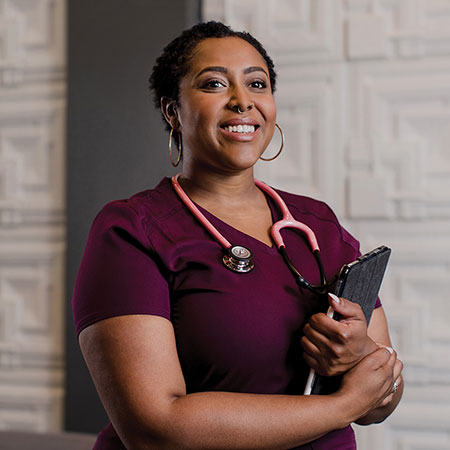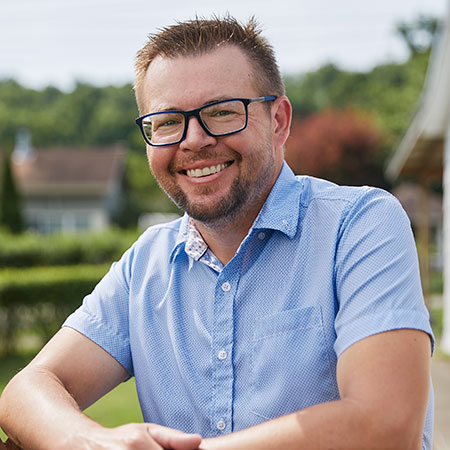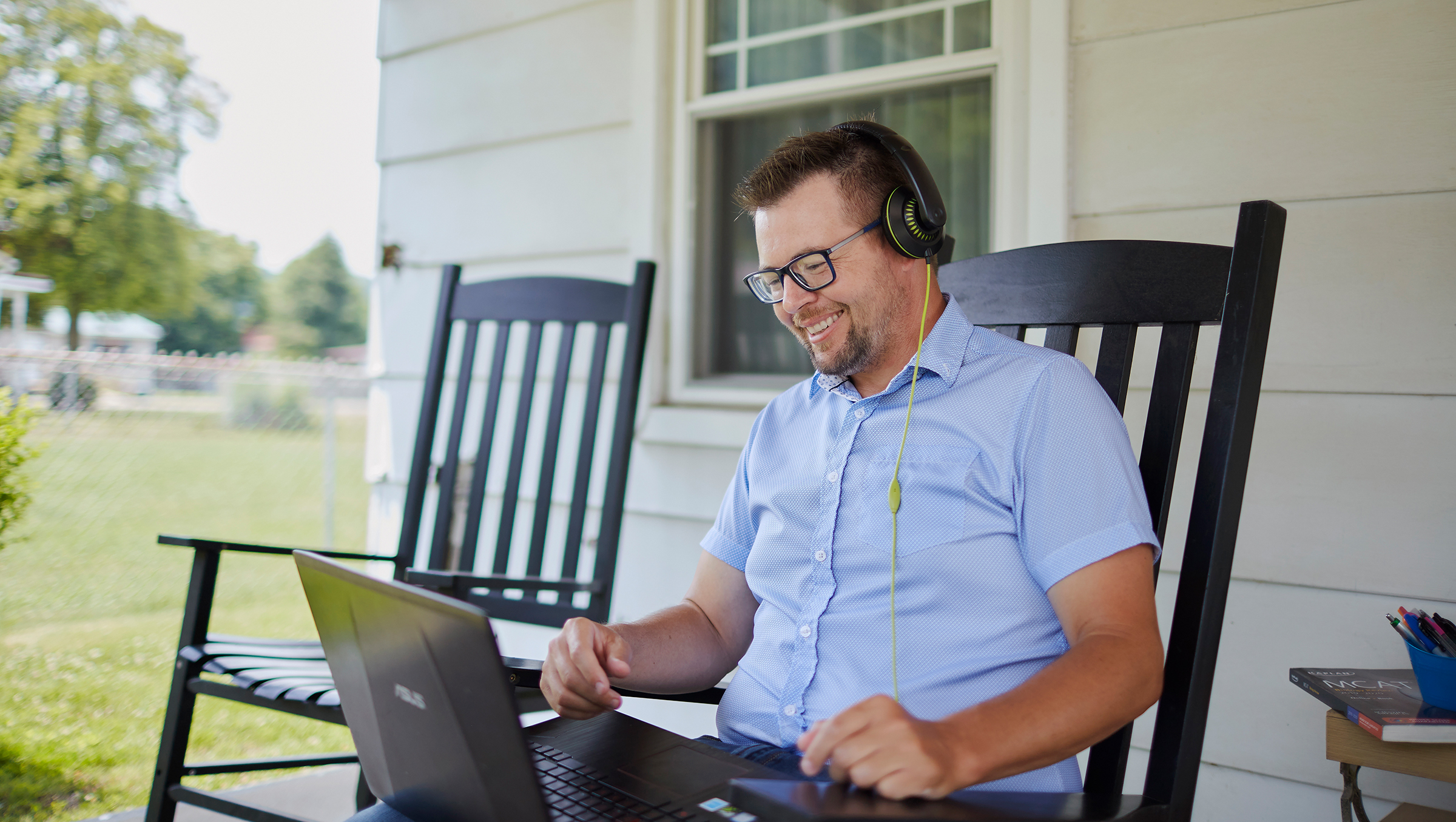Editor's note: This story is featured in the 2021 year in review. This story also appeared in the fall 2021 issue of ASU Thrive magazine.
Two recent Arizona State University graduates are on their way to medical school this summer, thanks to the opportunity to earn bachelor’s degrees through ASU Online.
Desiree’ Brionne Dillard earned a degree in biological sciences through ASU Online and will attend Mayo Clinic Alix School of Medicine in Scottsdale.
David Reed, who majored in biochemistry, will attend the Joan C. Edwards School of Medicine at Marshall University in West Virginia, where he lives.
Dillard and Reed, who both have children and worked while taking classes, say they could not have earned the rigorous prerequisites required without ASU Online.
“I would not be here if that program wasn’t available,” Dillard said. “There is no question that they prepared me well.”
Ara Austin, managing director of online programs in the School of Molecular Sciences, said that ASU Online coursework is exactly the same as the on-campus curriculum.
“Lots of people have this misconception that the online degree is not as rigorous as the on-campus program, and that is simply not true,” she said.
“How they go through the class is different, but the timeline and what they complete in the lab courses are identical.”
ASU Online students must complete their lab experiments in person, either on ASU’s Tempe campus or at institutions near them. The biochemistry degree requires three labs, and students can do all at once over seven days on campus.
“There are certain lab instruments that students have to learn to operate, and they can cost $10,000,” said Austin, who also is a clinical assistant professor and teaches organic chemistry online and in person.
“In organic chemistry, they do infrared spectroscopy, and in biochemistry, they use a PCR (polymerase chain reaction) machine.”
Austin, who has been with the online biochemistry program from the beginning, said that administrators assumed most ASU Online students would take their labs near their homes and transfer the credit. But they have found that about 85% of the students prefer to visit ASU’s Tempe campus. (Students were permitted to do labs remotely during the pandemic, but in-person labs have resumed this summer.)
“It gives them an opportunity to connect to their peers and the faculty, and they want to come and be part of our culture because that’s meaningful to them,” she said.
Transferrable to real life

Desiree’ Brionne Dillard gained experience as a medical assistant while completing her ASU Online courses. Photo by Jill Richards
Dillard knew from a young age that she wanted to be a doctor, though her journey to medical school took some turns.
“My grandmother worked in a cath lab back when Black women really couldn't become physicians, and my mother also spoke about how she always wished she had attended medical school,” she said.
When Dillard was pursuing her undergraduate degree in psychology at the University of Arizona, she became pregnant with her daughter.
“After a rough semester, I sought out guidance from my advisers, and every single one of them discouraged me from applying to medical school. I was told to pursue a different career.
“So I thought, ‘If it’s meant to be, it will happen.’”
She started a career managing energy-efficiency programs for low-income customers at Tucson Electric Power. The utility paid for employees to take classes related to their jobs, so Dillard earned a bachelor's in psychology and an MBA from Grand Canyon University, although business was not her true passion.
“I had started a PhD program and thought, ‘I don’t enjoy this. I want to go to med school,’” she said.
Shortly after giving birth to her son, Dillard moved to Tucson to be closer to family. Her son's father, accepted into the University of Arizona medical school, had been a pre-med student at ASU and was the one who told her about the ASU Online program.
Hearing him discuss his courses got her excited about the field again, so she started taking the science prerequisites she would need to apply to medical school.
“I went to undergrad for four years in person, and I felt like I was learning more at ASU Online just because of the structure and the ability to do things in my own time,” Dillard said.
“You can watch the videos over and over. There were more resources. And the professors were so involved.
“I was blown away by the fact that they have so many opportunities for office hours through Slack and Discord. Someone is always available to help you.”
Dillard worked as a medical assistant while taking classes.
“I learned so much about about patient care, such as how to take a blood pressure reading and patient history, through ASU Online,” she said. “It was completely transferrable to real life, even though it was a virtual setting.”
Dillard said she is interested in specializing in dermatology and pursuing a joint MD-JD through a partnership with ASU's law program.
“I know it’s incredibly ambitious, but I’d like to find a way to incorporate both into my practice,” she said.
“There’s a lot of need for Black women in those areas.”
Powering through

David Reed earned his bachelor’s degree in biochemistry from ASU Online and is on his way to medical school. He says he hopes to inspire others. “They can see that someone with kids did it, someone turning 40 did this.” Photo by Jeff Newton
While Dillard had a lifelong dream of attending medical school, Reed had never thought about it until a few years ago, when his infant son was hospitalized with meningitis and he saw the physician at work.
“It was a flashing-neon-light moment, and I started researching how I could get the prerequisites to go to medical school. I kept coming across ASU Online, which was popping up in my Facebook feed. And I realized it was the only option,” he said.
He was working 12-hour shifts at an aluminum mill at the time, so an in-person program was impossible.
Reed had earned a teaching degree at college, which he attended right after high school because he got a scholarship to play golf.
“I wasn’t ready, maturity-wise,” he said.
“I tried a bunch of things. I worked in a lumberyard. I ran my own business. I worked in an aluminum mill. But now I’m finally excited about what I’m doing.”
Reed started taking chemistry and biology courses through ASU Online when his twin sons were 7 months old.
“It was a lot of work. It felt like every spare moment, I was constantly watching a lecture or taking a quiz,” said Reed, who cared for his sons while his wife was at her full-time job.
He failed a chemistry exam and realized that he needed to change his studying methods.
“I had just powered through the material through sheer force of will, and I couldn’t do that anymore,” he said.
“I had to do practice problems because the exams don’t ask for regurgitation. They ask for application. And that mode really prepared me well for the MCATs.”
Things got better.
“It doesn’t stay pedal to the metal because you learn how to be more efficient and budget your time. And the boys began to sleep through the night and feed themselves.”
In the spring of 2020, he quit his job at the aluminum mill to focus on academics. That summer, he took his lab courses at the same time he was studying for the MCATs.
“I would not recommend that,” he said.
Both graduates showed remarkable levels of perseverance in achieving their goals.
“I can’t impress upon everybody how difficult this was,” he said. “You have to decide, ‘Am I going to practice balancing chemical equations instead of watching Netflix?’ You basically give up everything that takes your time, and you reapportion that time into your schooling.”
Reed, 38, was a founding member of the IDEAS Society at ASU, an academic club for online science majors, where he served as the pre-health officer and mentored other students who intend to pursue professional graduate degrees in STEM fields.
“Just being able to talk to other people who are pursuing your degree path and have the same interests as you is a big help,” he said.
A rigorous path
“I tried a bunch of things. I worked in a lumberyard. I ran my own business. I worked in an aluminum mill. But now I’m finally excited about what I’m doing,” David Reed says. Photo by Jeff Newton
Austin said that while Dillard and Reed are the first graduates of ASU Online to get into medical school, many graduates of other universities have taken individual ASU Online courses before being accepted to medical school.
“We’re willing to break the mold of a four-year university to open the door to all learners,” she said.
“Whatever goal they have, we can facilitate that by offering those courses to a wider audience by going online.”
Reed, who is considering specializing in pediatrics or palliative medicine, said he wondered how medical schools would perceive his online degree program.
“I was slightly worried about it until the pandemic. Then everyone finally realized that online is no joke,” he said. “My MCAT score shows that I learned the material and I had a rigorous path.”
Dillard, who will turn 30 the week after she starts medical school in July, said she hopes to show that online degrees open doors.
“I’m a huge advocate for nontraditional students,” she said.
“I questioned it for almost a decade, but now that I’m in this position, I realize that there are resources available and I don’t think I would be here without ASU Online.”
Top photo: Desiree’ Brionne Dillard earned her degree and studied for her MCAT while raising her family. Photo by Jill Richards
More Science and technology

How AI is changing college
Artificial intelligence is the “great equalizer,” in the words of ASU President Michael Crow.It’s compelled industries, including higher education, to adapt quickly to keep pace with its rapid…

The Dreamscape effect
Written by Bret HovellSeventh grader Samuel Granado is a well-spoken and bright student at Villa de Paz Elementary School in Phoenix. But he starts out cautiously when he describes a new virtual…

Research expenditures ranking underscores ASU’s dramatic growth in high-impact science
Arizona State University has surpassed $1 billion in annual research funding for the first time, placing the university among the top 4% of research institutions nationwide, according to the latest…

